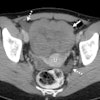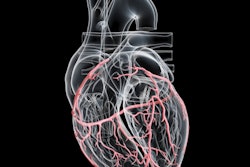
The combination of coronary CT angiography (CCTA) scans and functional tests such as stress echocardiography can predict the likelihood of heart attack and death in individuals at risk of coronary artery disease (CAD) based on their age, according to a study published online November 18 in JAMA Cardiology.
In a subanalysis of the Prospective Multicenter Imaging Study for Evaluation of Chest Pain (PROMISE), researchers from various U.S. institutions investigated the potential advantages of using noninvasive tests to evaluate patients suspected of having CAD.
"Given the aging population, more older adults are presenting for evaluation of symptoms possibly related to CAD," wrote the authors, led by Dr. Angela Lowenstern from the Duke University School of Medicine. "However, identifying those who are at an increased risk for future cardiovascular events remains unclear."
The researchers examined the data of 8,966 individuals who underwent either a CCTA exam or a functional test (exercise electrocardiography, nuclear stress testing, or stress echocardiography) at 193 different sites.
Overall, they found that positive CCTA and functional test results were increasingly more common with increasing age, regardless of the type of test. This trend also applied to the rate of heart attacks and death due to cardiovascular disease, which was 1.1% in individuals younger than 65 years, 2% in those ages 65 to 74, and 2.9% in those older than 75.
The researchers also discovered that CCTA and functional tests had statistically significant associations with an increased risk of heart attack and death within roughly two years after initial testing but for different age groups. A positive CCTA exam was associated with an increased risk in patients younger than 65 years old but not in those older than 65 (p < 0.001). In contrast, a positive functional test was associated with an increased risk only among patients older than 65 (p < 0.001).
| CCTA vs. functional testing on stratifying risk of heart attack, death | ||
| Hazard ratio age group | Positive functional test | Positive CCTA |
| Patients < 65 years | 1.09 | 3.04* |
| Patients 65-74 years | 3.18* | 0.67 |
| Patients > 74 years | 6.55* | 1.07 |
A subset of patients in the CCTA cohort also received coronary artery calcium (CAC) scoring on their CCTA scans. Analysis of this data revealed that high CAC scores (100 Agatston units or more) had a statistically significant association with an increased risk of heart attack and death in those younger than 65 but not in those 65 or older (p = 0.03).
"The different prognostic values of stress testing and coronary CTA that we observed among the different age groups suggest that the age of the patient may be an important consideration when choosing a test modality," the authors concluded. "In these ways, both the testing strategy and test interpretation can be tailored to the unique patient characteristics and used to guide patient-centered discussions surrounding treatment based on the individual risk for future [cardiovascular] events."




















